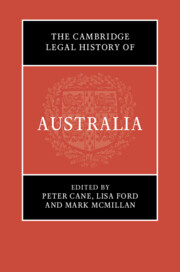Book contents
- The Cambridge Legal History of Australia
- The Cambridge Legal History of Australia
- Copyright page
- Contents
- Figures
- Maps
- Contributors
- Maps
- 1 Editors’ Introduction
- I Cultures of Law
- II Public Authority
- III Public Authorities in Encounter
- IV Land and Environment
- V Social Organisation
- VI Social Ordering
- 25 Criminal Law and the Administration of Justice in Early New South Wales and Van Diemen’s Land
- 26 Criminal Justice after the Convicts: A History of the Long Twentieth Century
- 27 Indigenous Peoples and Settler Criminal Law
- 28 Civil Wrongs
- 29 Labour Law
- 30 Place and Race in Australian Copyright Law: May Gibbs’s and Albert Namatjira’s Copyright
- VII Reckonings
- Index
27 - Indigenous Peoples and Settler Criminal Law
from VI - Social Ordering
Published online by Cambridge University Press: 04 August 2022
- The Cambridge Legal History of Australia
- The Cambridge Legal History of Australia
- Copyright page
- Contents
- Figures
- Maps
- Contributors
- Maps
- 1 Editors’ Introduction
- I Cultures of Law
- II Public Authority
- III Public Authorities in Encounter
- IV Land and Environment
- V Social Organisation
- VI Social Ordering
- 25 Criminal Law and the Administration of Justice in Early New South Wales and Van Diemen’s Land
- 26 Criminal Justice after the Convicts: A History of the Long Twentieth Century
- 27 Indigenous Peoples and Settler Criminal Law
- 28 Civil Wrongs
- 29 Labour Law
- 30 Place and Race in Australian Copyright Law: May Gibbs’s and Albert Namatjira’s Copyright
- VII Reckonings
- Index
Summary
Australian indigenous peoples are among the world’s most incarcerated populations. The nineteenth century origins of this fact lie in Australian legal histories, of the interaction of indigenous peoples and British criminal law introduced in the course of colonisation. This chapter considers first the assertion of criminal jurisdiction in law and statute in the early nineteenth century, paying attention to some significant differences between the colonies. Second, we look at some elements of criminal trial, including the treatment of Aboriginal evidence and the role of interpreters. Third, the chapter examines the importance of the criminal justice system’s putative concern with victimisation and the justice due to victims.Finally we consider some evidence about the system-wide impacts of the assertion of criminal jurisdiction over indigenous peoples, including patterns of prosecution and punishment. Understanding these legal histories makes clear how the legal system’s professed principles of justice and fairness compounded discrimination and disadvantage.
Keywords
- Type
- Chapter
- Information
- The Cambridge Legal History of Australia , pp. 629 - 650Publisher: Cambridge University PressPrint publication year: 2022



